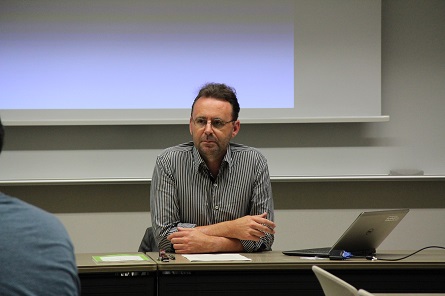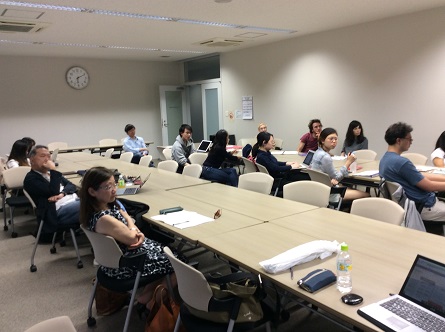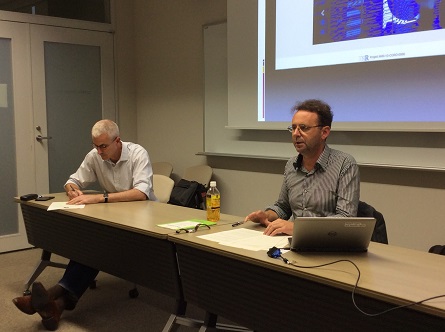【報告】ピエール・アントワヌ・シャルデル氏講演会
What is the fate of ethics in our hypermodern, technological times? And how can a marriage of ideas from a Japanese philosopher, who was active in the 1970s, with those of a contemporary French philosopher lend understanding to this question? It was this interrogation that animated the UTCP seminar on the sultry afternoon of the 12 June 2018.
Aptly entitled “Technological Ambivalence in the Hypermodern Era: An Eco-Ethical Approach to our Digital Environment,” the University of Tokyo had the pleasure of hosting Pierre-Antoine Chardel, who is Professor of Social Sciences and Ethics at the Institut Mines-Télécom and Researcher at the École des hautes études en sciences sociales in France.

At a general level, Chardel’s point of departure was to understand why, after the establishment of the discipline of environmental ethics in the 1970s and its concomitant rejection of the (Western) anthropocentric conception of the natural world, the Japanese philosopher, Tomonobu Imamichi, chose to buck the trend. The reason, according to Chardel, is quite simple. In his desire to focus ethical reflection on the environment in the context of technological globalisation, Imamichi supported a classic anthropocentric approach that embeds the human in nature. He advocates the notion of eco-ethics, which explains the continued relevance of the late Japanese philosopher to modes of ethical reflection that situate the subject within an environmental – natural as well as digital – context today.
Chardel then turned to an articulation of the ideas encapsulated in the title of his seminar and mapped out the ethical consequences of our digital environment and how it redefines subjectivity. To this end he argued that Imamichi’s thought upholds the unconditional principle of human dignity, which itself is embedded in the “eco” – viz., context and place, or world. Drawing on the philosophy of Emmanual Levinas, Chardel showed how Imamichi sought to territorialise Levinas’ thought and develop an ethics of radical responsibility. Although this may seem like a repetition of humanism with its central anthropocentric tenet, Chardel explained how Imamichi invokes an original Ancient Greek humanism in which ethical reflection incorporates the natural environment, hence an “eco-ethics.” Moreover, as Félix Guattari highlights, our environment is always technological, or what he terms “techno-nature.” In short, if (human) being is inseparable from the environment, which in turn is inescapably technological, then Imamichi offers an ethical framework through which to think our present predicament vis-à-vis the transformations of subjectivity in the context of present modes of digitalisation.

According to Chardel, there are two aspects of the latter that sound the ethical alarm bells. Firstly, ethics is anything but a foregone conclusion in a technical environment that always harbours ambivalence. For the most part intersubjective communication takes place at a distance, or at best through virtual mediation. From the Levinassian perspective advocated by Imamichi, there is no face to hail me forth into ethical responsibility. Secondly, the technological environment of our hypermodern era brings with it an upheaval in coexistence. Relationships are similarly mediated by the technological, yet despite being opened up to the difference in the world, we tend to turn inwards and forget about the other at the receiving end of our device mediated communication. As Heidegger is believed to have once quipped at the dawn of the global village, the nearness of being does not necessarily bring beings any nearer!
Chardel used this philosophical impasse to introduce the thought of several contemporary French thinkers and in particular that of Bernard Stiegler. The reason is his interpretation of the inherent ambivalence of technology through its conceptualisation as pharmakon; that is, technology is both remedy and poison (and the essence of our being, hence a dependency, too). Whether in the thought of Imamichi or Gilbert Simondon, the challenge is to foster autonomous citizens who are reflexive and critical in the face of technocratic thinking and imperatives of consumption. With this in mind, Chardel spoke of Imamichi’s deployment of the notion of geido (芸道). With an emphasis on the way (道) – in Ralph Waldo Emerson’s register, the priority of the journey over the destination – geido promises an opening to alternative modes of existence in which the act of crafting (芸, which is akin to a technē) bears critical fruit in virtue of its elaboration in a parallel dimension of time. Such a notion is arguably more relevant than ever within a technological framework where the means notoriously subsume the ends, most notably via the diminution of duration by technology and the associated constriction of ethical subjectivity. For Chardel, Stiegler’s relevance is how he takes up this challenge from a perspective of generalised proletarianisation. Stiegler argues that within our hypermodern digital environment we lose both a sense of savoir-faire and savoir-vivre, which leaves us technologically illiterate. Ethics is at risk of dispersal in the network, while the subject gets lost in the database.

In conclusion, Chardel raised the possibility of an aesthetics of coexistence. In this respect, Stiegler speaks of the need for analytical modes of reception that can call into question the discourses of territorialisation that accompany each technology. A culture of action and interpretation would substitute technological illiteracy for technological praxis. It would necessitate a practice of philosophy in the form of an interdisciplinary collaboration with an ethical sensibility that was less a system and more an articulation of subjectivity in the context of embedded technology. In this way we can begin – with Stiegler – to envisage desirable futures where technology is a socio-political and economic environmental object that is thought in context – in a similar vein to what Imamichi imagined with an eco-ethics.
(Reported by Bregham Dalgliesh)






